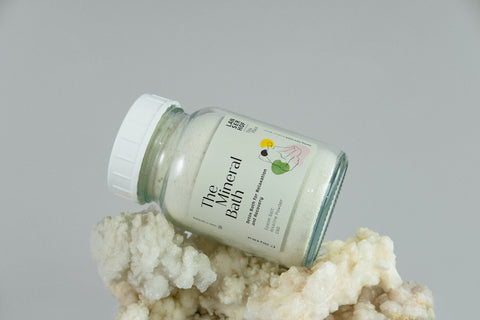Part 3 of the "What's in it is what's good. For you and your skin" series by This Place. You want to better understand the INCI list of your cosmetics? The series of articles "What's in it is what's good. For you and your skin" by This Place. We started with Bakuchiol, a plant that has only recently been celebrated as a Hero Ingredient. You can access the other articles via the links at the bottom of the page.
Magnesium. This essential mineral is filed away in most people's minds in the category "good for my muscles". But when it comes to listing foods that contain magnesium, for example, would you spontaneously be able to name three others besides milk? And did you know that magnesium has long since proven itself as a hero ingredient in skin care?
The following article will turn your two possible no's into several aha moments. And in the end, you'll be as excited about this mineral as we are at This Place.
Plus, we'll tell you why thirsty cattle turned a small London suburb into one of England's first spa towns. Curious? Then dive into the topic of magnesium with us!
- What is Magnesium?
- Why is magnesium important for your body?
- Magnesium as a nutrient in food and cosmetic products
- Magnesium, a Glow-Booster: How magnesium works on the skin
- Magnesium as a Hero Ingredient in The Mineral Bath from This Place
- Bottom line: Magnesium as a beauty mineral
What is Magnesium?
Magnesium is a vital mineral that is involved in numerous functions of your body. Your body alone consists of about 20 g to 25 g of magnesium [1;7]. What may not seem like much in relation to your total weight is nevertheless significant in the end. Magnesium is the fourth most abundant electrolyte in your body [7]. That's why it has a decisive influence on your fluid balance and its equilibrium, among other things. But that's not all, as you will see in the course of this article.
About 99 percent of your body's total magnesium moves intracellularly, primarily in your bones, muscles or soft tissues [7]. The rest of the magnesium is in your blood.
Since magnesium is very reactive, it does not occur in the wild as a pure substance (as a pure element). The most common compounds include different magnesium salts such as carbonates, chlorides and sulfates. About 1.4 percent of the earth's crust consists of magnesium compounds, including even mountains! [1]
For the sake of simplicity, however, we will speak primarily of magnesium in the following text.
Why is magnesium important for your body?
As an important supporter of numerous biochemical processes, your body combines magnesium with around 600 enzymes [7] .
Magnesium is not only involved in the optimal functioning of your muscles. Millions of cells need magnesium to ensure their energy supply and thus also their growth. At the same time, magnesium influences about 300 metabolic processes [1], the formation and maintenance of healthy bones and your cardiovascular system. Your body's nerves also need magnesium to function optimally.
A magnesium deficiency can not only be very painful when you wake up (for example at night) with muscle cramps in your calves or thighs, but also dangerous. Namely, if the magnesium deficiency in combination with other influences is so severe that it can promote cardiac arrhythmias, osteoporosis or diabetes (type 2). In addition, fatigue or tiredness can also be signs of magnesium deficiency.
A connection between magnesium deficiency and depression is also suspected [1]. This is because magnesium is involved in the formation of the happiness hormone serotonin, among other things, while it can inhibit the formation of stress hormones.
In short, for these many functions alone, as well as a valuable nutrient for maintaining your health, the mineral magnesium is essential. It gets even more exciting when we look at what magnesium does on the outside, i.e. on your skin.
But before that, you'll learn which products - food and cosmetics - contain magnesium.
Magnesium as a nutrient in food and cosmetic products
Magnesium in food: Good for your health
The German Nutrition Society estimates that the adult body needs about 300 mg (women) to 350 mg (men) of magnesium daily, depending on gender. [7]
You can start to cover your daily requirements with your breakfast.
Almonds, sunflower seeds, pumpkin seeds, flaxseeds and sesame seeds as toppings for bread, rolls or your oatmeal cereal guarantee a high magnesium content. Bananas and dark chocolate also contain the mineral. And the combination of cocoa powder and milk offers two foods rich in magnesium. If you then go for legumes, fish or seafood at lunchtime, you'll have your daily requirement pretty well covered. [7]
Magnesium in cosmetic products: manufacturers rely on it
Magnesium is used in various compounds in numerous cosmetic products. One of the most important compounds is magnesium sulfate (INCI: Magnesium Sulfate). Magnesium sulfate serves as a stabilizer of the cream mixture in the manufacture of creams. At the same time, it affects the viscosity of formulations, i.e. how liquid a product is. It is found in face and body creams or serums as well as in hair care products, for example in conditioners. It is also a component in deodorants or decorative cosmetics.
Magnesium chloride (INCI: Magnesium Chloride) has a similar ph value to your skin and, like magnesium sulfate, influences the viscosity of products.
Some brands offer so-called magnesium oils or magnesium flakes with magnesium chloride as the main ingredient. Generally, however, this compound is more commonly found in dietary supplements to help with calf cramps or constipation [6]. Please note that according to the current state of science, transdermal absorption - i.e. absorption through the skin alone - of magnesium chloride does not replace a balanced diet rich in magnesium.
By the way, magnesium chloride is one of the most important components of thermal springs and seawater, for example the Dead Sea. In the sea, it also contributes to the slightly bitter taste of the water [6].
Magnesium, a Glow-Booster: How magnesium works on the skin
Now that you know how magnesium affects your health and what it contains, let's take a look at magnesium as a true beauty mineral for your skin.
You may have already heard about it: bathing in the Dead Sea and baths in magnesium salt itself are among the oldest naturopathic therapies for various (skin) diseases [2; 4] - and not without reason. Thanks to its anti-inflammatory effect, magnesium supports the healing processes of your skin. This effect also alleviates redness. In addition, magnesium can have a positive effect on the healing of skin blemishes, such as acne. At the same time, magnesium accelerates the restoration of your intact skin barrier [3], for example after injuries.
The mineral becomes a true glow booster due to its moisture-binding properties. It has been proven that magnesium-containing baths reduce transepidermal water loss, which improves moisture retention in your skin [4]. In addition, magnesium makes your skin appear more supple by effectively counteracting skin roughness [4]. This effect, together with the anti-inflammatory effect, has a positive impact on the appearance of your skin: Your complexion glows.
Magnesium compounds can also contribute to anti-aging. They support your skin in the fight against free radicals, which can cause your skin to age prematurely.

Magnesium as a Hero Ingredient in The Mineral Bath from This Place
In addition to cocoa butter, magnesium sulfate and magnesium chloride are Hero Ingredients in The Mineral Bath, This Place's reharmonizing bath powder. In the form of Epsom salt, it is a component of the balanced phyto-mineral formulation here.
Epsom-Salt, a success story
The name Epsom Salt is derived from the suburb of the same name southwest of London. Here, in the hot summer of 1618, a cowherd looking for a watering hole for his herd is said to have stumbled across a spring from which his animals refused to drink. When he himself tasted the water from this spring, he noticed a distinct bitter taste. But not only that: the shepherd also observed that wounds of animals that waded through the magnesium-rich water seemed to heal faster.
Soon this discovery attracted numerous people to Epsom, making the town one of the first spa towns in England by the end of the 17th century. The therapeutic offer ranged from baths in the magnesium-rich thermal spring to drinking cures [8; 9; 10].
Even today, Epsom salt enjoys great popularity in spas and floating centers due to its revitalizing properties, where it is often the main component of the water pools. Commonly, Epsom salt is called "Epsom salt" because of its white color and salt-like consistency. However, it is not suitable for cooking.
Traditionally, Epsom salt is said to have a loosening, relaxing effect. There are positive reports on the treatment of psoriasis, arthritis (inflammation of the joints) and rosacea (chronic inflammatory skin disease) with magnesium-containing baths. However, scientific proof of this has yet to be confirmed.
Bottom line: Magnesium as a beauty mineral
Skin, heart, brain - your body benefits from magnesium in numerous processes. In addition to the intake through food, you have the possibility to care for your body with cosmetic products containing magnesium. The external application of this nutrient goes back to centuries-old naturopathic therapy approaches such as bathing in the sea and thermal springs.
In your diet, magnesium protects you, among other things, from muscle cramps at night or after exercise, but also diseases such as diabetes (type 2) or osteoporosis. In addition, this nutrient strengthens your nerves and muscle development.
Used externally, magnesium has made a name for itself as a mineral for beautiful skin. Here it supports your reharmonized skin, free of redness and pimples. At the same time, it helps to keep your skin soft and supple. Thanks to its moisture-retaining properties, your complexion will also appear hydrated. These effects make magnesium a true glow booster and beauty miracle weapon in the fight against rough, dry skin and premature aging.

